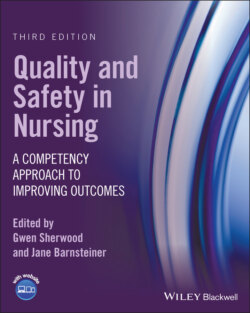Читать книгу Quality and Safety in Nursing - Группа авторов - Страница 38
Evolving Nurses' Roles
ОглавлениеClinicians in all levels and areas of health care should have goals for improving quality and safety, yet nurses are at the forefront. The 2010 report, The Future of Nursing: Leading Change, Advancing Health, notes the critical nature of nursing in quality and safety (IOM, 2011):
Overcoming challenges in nursing is essential to overcoming the challenges in the health care system as a whole. Nurses are the largest segment of the health care workforce, and their skills and availability can directly affect quality, safety, and efficiency. Most nurses work in hospitals or other acute settings, where they are patients’ primary, professional caregivers and the individuals most likely to intercept medical errors. However, because hospital systems and acute care settings are often complex and chaotic, many nurses spend unnecessary time hunting for supplies, filling out paperwork, and coordinating staff time and patient care, reducing the time they are able to spend with patients and delivering care.
Figure 1.4 Incorporating Institute of Medicine (IOM), Quality and Safety Education for Nurses (QSEN), Interprofessional Education Collaborative (IPEC), and TeamSTEPPS to develop safety competencies.
This public recognition of the complex and essential role nurses have in health also reveals more about that complexity. Increasing nurses’ awareness of quality and safety developed within new science applications will help them recognize quality and safety concerns in their practice and in their settings. Many remain largely unaware of the scope of the problems. Many completed their academic programs before implementation of the QSEN and IPEC competencies and must learn on the job how to identify, report, and systematically analyze a near miss or sentinel event or lead a QI team (Chenot and Christopher, 2019; Yang and Liu, 2021). Nurses have a key role in improvement work because they see the variability in care with results that do not match benchmarks. Two approaches for change are teaching nurses ways to speak up as a change agent and learning measurements to demonstrate gaps in care.
A mindset of inquiry, of asking questions, is the first step in leading system improvements. Openness to be receptive to feedback, willingness to see the consequences of one’s actions, and willingness to change can prompt discussions among staff to examine processes for improvement. Reflective practice is a change process using systematic questions to examine experiences in the context of what one knows and values, other perspectives, and the situational context (see Chapter 12). Asking questions opens the capacity for innovation and the application of evidence‐based practice standards and QI projects.
Developing awareness of their practice empowers nurses to acknowledge repetitive work‐arounds, near misses, and outdated procedures (Yang and Liu, 2021). Nurses need to know what and how to report and ways to initiate discussions for change. Conducting an annual safety culture survey can identify areas for workplace improvement, such as the suite of surveys available from AHRQ, Surveys on Patient Safety Culture (SOPS, https://www.ahrq.gov/sops/index.html). Scorecards, dashboards, and report cards are other useful strategies for collecting and monitoring data about services and care provided in key areas. In academic settings, educators should establish a culture of safety and quality for their own educational processes, such as a reporting system of learner near misses and errors to assess processes and increase safety awareness.
Nurses also need more preparation for engaging patients as active participants in their care and effectively including patients and families in decision‐making. Patients and their families should be informed of all care, with access to information to achieve transparency in the system, and have full disclosure of any safety events.
The more that nurses are empowered with shared decision‐making about creating a work environment where they feel accepted with a sense of belonging, the higher their sense of satisfaction will be. Nurses want to work in organizations known for quality; they want to know that their work has meaning, that it makes a difference. It is this way of meaningful recognition that provides joy and satisfaction, which serve to further inspire good work (www.aacn.org; Lucien Leape Institute, 2013).
